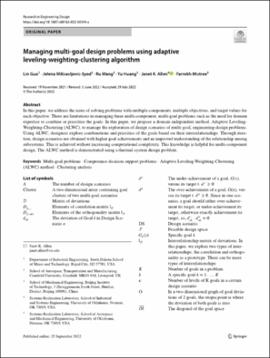| dc.contributor.author | Guo, Lin | |
| dc.contributor.author | Milisavljevic‐Syed, Jelena | |
| dc.contributor.author | Wang, Ru | |
| dc.contributor.author | Huang, Yu | |
| dc.contributor.author | Allen, Janet K. | |
| dc.contributor.author | Mistree, Farrokh | |
| dc.date.accessioned | 2022-10-24T17:38:52Z | |
| dc.date.available | 2022-10-24T17:38:52Z | |
| dc.date.issued | 2022 | |
| dc.identifier.citation | Cite this article Guo, L., Milisavljevic-Syed, J., Wang, R. et al. (2022). Managing multi-goal design problems using adaptive leveling-weighting-clustering algorithm. Research in Engineering Design. https://doi.org/10.1007/s00163-022-00394-z | en_US |
| dc.identifier.uri | https://hdl.handle.net/11244/336578 | |
| dc.description.abstract | In this paper, we address the issue of solving problems with multiple components, multiple objectives, and target values for each objective. There are limitations in managing these multi-component, multi-goal problems such as the need for domain expertise to combine or prioritize the goals. In this paper, we propose a domain-independent method, Adaptive Leveling-Weighting-Clustering (ALWC), to manage the exploration of design scenarios of multi-goal, engineering-design problems. Using ALWC, designers explore combinations and priorities of the goals based on their interrelationships. Through iteration, design scenarios are obtained with higher goal achievements and an improved understanding of the relationship among subsystems. This is achieved without increasing computational complexity. This knowledge is helpful for multi-component design. The ALWC method is demonstrated using a thermal-system design problem. | en_US |
| dc.description.abstract | Lin Guo acknowledges Shehnaz Shaik for programming contributions. Lin Guo acknowledges the financial support from the Pietz Professorship and Start-Up Fund at the South Dakota School of Mines and Technology. Lin Guo and Janet K. Allen gratefully acknowledge the financial support from the John and Mary Moore Chair at the University of Oklahoma. Lin Guo and Farrokh Mistree gratefully acknowledge financial support from the L.A. Comp Chair at the University of Oklahoma. Ru Wang gratefully acknowledges the Project funded by China Postdoctoral Science Foundation [Grant 2018M640073]. Financial support was provided from the Office of the Vice President for Research and Partnerships and the Office of the Provost, University of Oklahoma for assistance with publication charges. | en_US |
| dc.language | en_US | en_US |
| dc.rights | Attribution 4.0 International | * |
| dc.rights.uri | https://creativecommons.org/licenses/by/4.0/ | * |
| dc.subject | multi-goal problems | en_US |
| dc.subject | compromise decision support problems | en_US |
| dc.subject | adaptive leveling-weighting-clustering (ALWC) method | en_US |
| dc.subject | clustering analysis | en_US |
| dc.title | Managing multi-goal design problems using adaptive leveling-weighting-clustering algorithm | en_US |
| dc.type | Article | en_US |
| dc.description.peerreview | Yes | en_US |
| dc.identifier.doi | https://doi.org/10.1007/s00163-022-00394-z | en_US |
| ou.group | Gallogly College of Engineering::School of Industrial and Systems Engineering | en_US |

